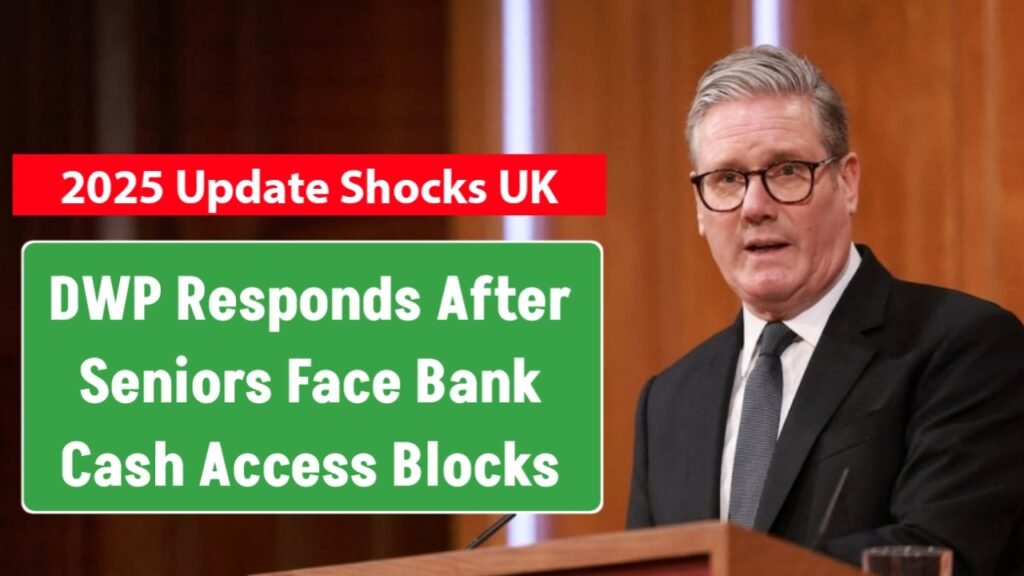In early 2025, reports began to surface across the UK about seniors facing unexpected blocks when trying to access cash from their bank accounts. For many pensioners, especially those living in rural areas or relying on face-to-face banking, this sudden barrier has caused stress, confusion, and in some cases, financial hardship. The Department for Work and Pensions (DWP) has now responded to the issue, aiming to reassure those affected and outline the steps being taken to protect older citizens’ rights.
How The Issue Began
The situation started when several major banks introduced new security and compliance measures. These were designed to prevent fraud, money laundering, and unauthorised withdrawals, but they also had unintended consequences. Seniors who were not familiar with modern digital verification methods, such as mobile banking codes or biometric ID checks, found themselves locked out of their accounts. Some even reported being unable to withdraw their State Pension or Personal Independence Payment (PIP) in cash, leading to frustration and fear.
DWP’s Official Statement
Following growing media coverage and pressure from advocacy groups, the DWP confirmed that they were aware of the issue and in active talks with UK banks. A spokesperson stated that no senior citizen should be left without access to their legally entitled benefits due to technological or procedural barriers. The department stressed that while anti-fraud measures are important, they must be balanced with accessibility for vulnerable groups.
Seniors Hit The Hardest
For many older UK residents, cash remains their primary method of payment. They may not use online banking, and in some cases, they live in areas with poor internet connectivity or no local branch. Losing access to cash, even temporarily, can mean being unable to pay for groceries, transportation, or essential bills. Charities such as Age UK have warned that financial exclusion is becoming a growing problem for older citizens.
Role Of Banks In The Controversy
Banks have defended their actions by pointing to the rising threat of financial scams targeting the elderly. However, critics argue that these measures have gone too far, punishing law-abiding seniors along with criminals. Some banking institutions have now pledged to review their procedures and provide alternative verification methods that don’t rely solely on smartphones or complex technology.
Impact On Pension Payments
The situation has also raised questions about how benefits like the State Pension, PIP, and Attendance Allowance are delivered. Traditionally, many seniors have collected these payments in cash at their local post office or bank branch. With branch closures and stricter access rules, the process has become increasingly difficult. The DWP has confirmed that they are considering more flexible payment options to ensure that older people can continue receiving their benefits without disruption.
Calls For Government Action
Campaigners are urging the government to introduce a “Right to Cash” law that would guarantee easy access to physical money for all UK residents, regardless of where they live or their technological skills. Similar legislation has been discussed in Parliament before, but the recent events have renewed the urgency for action.
Alternative Payment Solutions
Some experts suggest that seniors affected by bank access blocks should explore alternatives such as Post Office card accounts, prepaid debit cards, or benefit payments made directly to trusted carers. However, these solutions also come with challenges, including potential fees and the need for extra security against fraud.
What This Means For The Future
The DWP’s involvement in the issue signals that the government recognises the seriousness of the problem. While a permanent fix may take time, the immediate focus is on ensuring that no senior is left without access to their benefits. This could mean stronger regulations for banks, better communication with customers, and the introduction of new cash-access points in underserved areas.
Advice For Seniors Facing Cash Blocks
If you or someone you know is struggling to access cash, the first step is to contact your bank directly and explain the situation. Request alternative ways to verify your identity, such as in-person checks at a branch or local Post Office. You can also contact the DWP to report any problems with accessing benefit payments. Additionally, local councils and charities often have emergency support funds for those experiencing financial hardship.
Public Reaction To The 2025 Update
The DWP’s latest update has sparked mixed reactions. Many seniors welcome the acknowledgement of the problem and hope for quick solutions. Others remain sceptical, believing that banking policies will continue to favour digital services over cash access. Social media has been flooded with personal stories of frustration, with some pensioners saying they felt “treated like criminals” when trying to withdraw their own money.
The Road Ahead
The issue of cash access for seniors is unlikely to disappear anytime soon. With the UK moving towards a more digital economy, the challenge will be balancing security with accessibility. The DWP’s statement in 2025 is an important first step, but campaigners insist that promises must be followed by concrete action. For now, pensioners and their supporters will continue to push for fair treatment and practical solutions that protect both their money and their independence.
